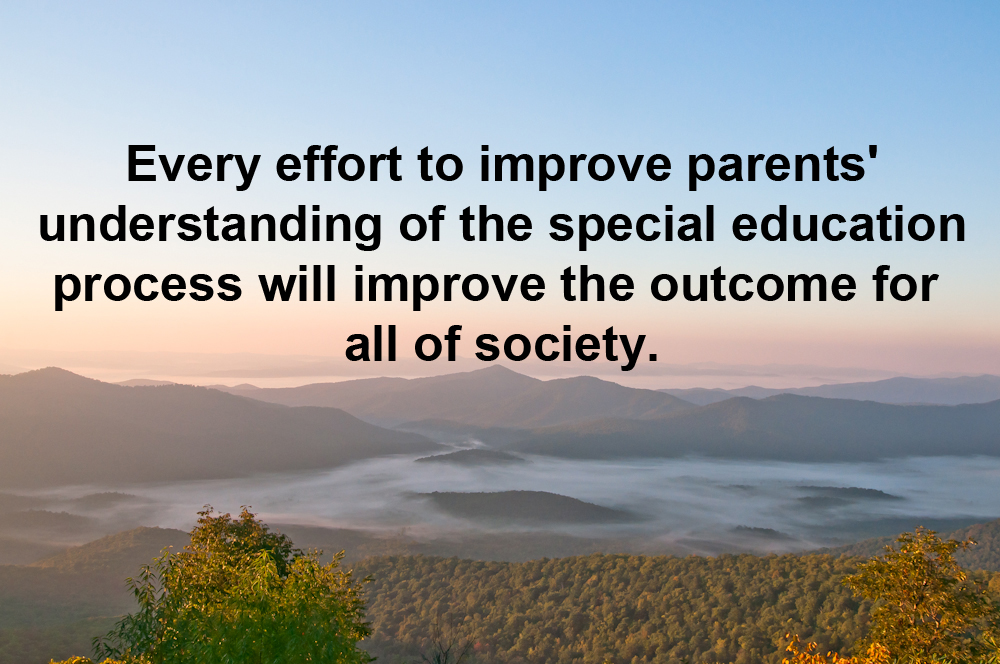Almost 30 years of research and experience has demonstrated that the education of children with disabilities can be made more effective by having high expectations for such children and ensuring their access to the general education curriculum in the regular classroom, to the maximum extent possible… 20 U.S.C. §1400 (c)(5)(A)
In our book, we describe how important it is for both parents and schools to have high expectations for children in special education. Without high expectations from all involved, the education process fails the child. The following is Part II of our article on IDEA and Expectations, “The Importance and Promise of High Expectations.”
Click here to read Part I: The Problem of Low Expectations
Can You Solve Everyone’s Problems?
Writing Parents Have the Power to Make Special Education Work was a way for us to translate our experience in special education into a guide for other parents going through the same process. We were firmly convinced that by conveying the lessons we learned, together with a survey of special education from the perspective of a fellow parent, we could help other parents attain the appropriate education for their children that is mandated by state and federal law.
In theory, our goal made sense. We had information that other parents could use and that we had needed when we started our journey through special education. We could point out the pitfalls in the process, such as the “business plan” of many school districts that places budget priorities ahead of a child’s needs and dares parents to endure due process just to attain the education that is their child’s right. We offered many tips and techniques, most costing little or no money, that would help parents keep schools from shortchanging their children’s education, recognize conflicts of interest with school employees, and learn to create effective IEP goals.
Despite our intentions, there was always the nagging feeling that no matter how much information we provided and no matter how clearly we organized and presented that information, it wasn’t enough. The reality is that we couldn’t do more than provide a general outline of the issues that parents face and the solutions that they might need. The problems with special education are too diverse, and too many families face issues with their school districts that are specifically unique to them. So, how could a book like ours really help the very people for whom we wrote our book?
Then Why Try?
The answer came from a source with many more years of experience and with a history of a much greater involvement in special education than we had. As our manuscript reached completion, we followed up on a dream we had of approaching a person whose work we had admired for many years to write the foreword. This was Bob Crabtree, coauthor of the first comprehensive special education law in the country, Massachusetts’ Chapter 766, which served as the model for the federal special education law, the Individuals with Disabilities Education Act (IDEA). He graciously agreed to review a manuscript from two strangers and unknown authors asking for a favor. Happily, he liked what he read and agreed to write a foreword that detailed the history of Chapter 766, related it to the civil rights movement, and warned readers of the political forces that were constantly seeking to undermine IDEA’s mandate. We were delighted to have such an important contribution to our book.
In subsequent conversations about the still unfulfilled promise of special education, Crabtree expressed what he saw as the true value of our book. Even though we could not provide explicit solutions to meet every parent’s needs, we could educate families about how special education should work and warn them about how it too often failed to work. These parents, Crabtree explained, would begin to expect more from their schools and the political process that ultimately influenced school policy. The goal was to create a critical mass of informed parents.
So, What Is The Promise?
Individuals, or even small groups, do not possess enough power to change a large bureaucracy like special education that is mostly concerned with a limited budget and self-preservation. But collectively, a rising tide of expectations among parents, reinforced by positive examples of success and a better understanding of the rights of children with disabilities, will create irresistible pressure on local school districts and politicians to pay more than lip service to the law’s mandate. In short, the more parents who have high expectations, the more schools and politicians will act toward actually fulfilling the promise of special education.
The opposite of this, of course, is ignorance and passive acceptance of what the school system offers, even when the school is in clear violation of the letter and intent of the law. An even worse situation is created when poorly informed parents with unfocused anger confront their special education liaisons and service providers about issues over which these school employees have little or no control. We have seen this many times, and it almost always creates a feeling of hopelessness for the parents, active resistance from the schools, and possibly even retaliation for the child.
So no, we don’t have the answers to every situation or the solution to every problem faced by parents in the special education system. We do know, however, that every effort to improve parents’ understanding of the special education process, alert parents to the hidden agenda of the schools and the political forces behind public education, and explain the purpose of the laws providing an appropriate education for children with disabilities, will improve the outcome for all of society.
I’m asking all of us to redouble our efforts and redouble our supports. High expectations must be the norm, not the exception.
— Secretary of Education Arne Duncan, 2010
Judith Canty Graves and Carson Graves


